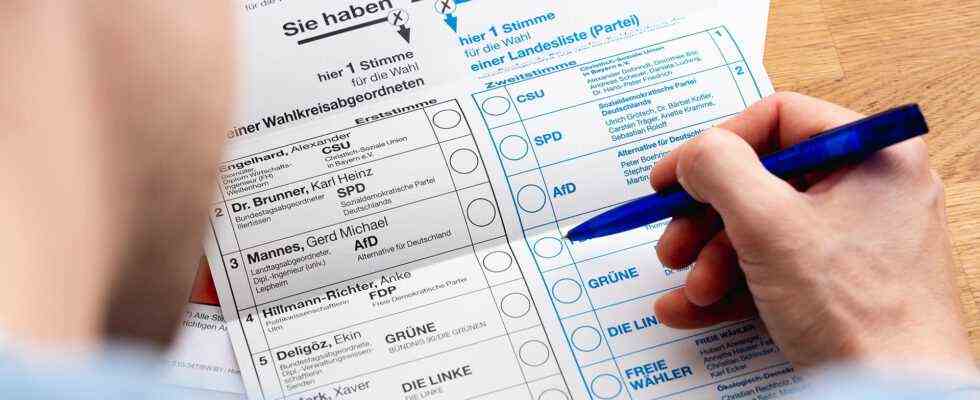Status: 18.09.2021 09:33 a.m.
Are the Greens forming a coalition with the Union? With the SPD? Or are they all out in the end because black-red-yellow go together? Tactical voting is difficult with so many conceivable constellations. Does it even work?
The SPD does not categorically rule out forming a coalition with the Left Party. The Greens do not make a clear statement here either. The FDP remains open to form a government with the SPD and the Greens. It is also unclear whether the Union would also join a grand coalition as a junior partner if necessary. The same applies to the SPD. In short: everything is open, little is excluded – so it is complicated. Not only with regard to the formation of a government after September 26th, but also beforehand for the voters. With their voice they create the starting point for everything that happens then, so to speak. And that’s pretty unpredictable for the reasons mentioned above. Difficult times for a tactical choice.
What is tactical voting?
“Sincere voting” means that whoever prefers a party will also vote for it. In contrast, tactical or strategic voting is “round the corner” voting. An example: A CDU supporter does not want a grand coalition – and therefore chooses the CDU candidate in his constituency with the first vote and the FDP with the second vote.
What is different for tactical voters in this federal election?
Much. Chancellor Angela Merkel is no longer running, the Union and the Greens have slipped in the past few weeks, the SPD has struggled, the election results are actually open as rarely. “Tactical voting can only be difficult if it is really relevant, otherwise it is meaningless,” says Albrecht von Lucke from the “Blätter für German and international politics”. “If the threatening red-red-green backdrop opens up – Olaf Scholz’s lead could actually be equalized or even overtaken.” Tactical voting could therefore play a role if, for example, AfD supporters turned to the Union out of concern about a left alliance.
Political scientist Thorsten Faas from the Free University of Berlin is more skeptical. “Choosing strategically has never been more impossible than this election,” he tweeted. In the Phoenix podcast “Unter 3” he justified this with the fact that it was seldom so open who formed a government alliance with whom. “It doesn’t really work. You can’t say that if you vote, then it will happen. The coalition situation just doesn’t allow it.”
How is the coalition situation?
After the general election, various alliances are conceivable across the camp borders. Most likely, it currently boils down to two constellations: an alliance of the Union, the Greens and the FDP. Or a coalition of the SPD, the Greens and the FDP. Other alliances are less likely, but still possible: For example, a renewed grand coalition or a coalition of the SPD, Union and FDP. Likewise: a red-green-red alliance. And maybe it will even be enough for a red-green coalition. Only the AfD has no alliance option.
Why is there a first and a second vote?
Arndt Brorsen, NDR, 6/8/2021 2:18 p.m.
And what if voters primarily want to determine the Chancellor indirectly?
If it is more important for the voter to support the person who is supposed to make it to the Chancellery, the decision is more difficult. If you want a Chancellor Laschet, you basically have no choice but to choose the CDU or the CSU. The FDP has announced that it would prefer to govern with Laschet. But she has not ruled out the possibility of electing Scholz as Federal Chancellor.
The situation is similar with the candidate Scholz: If you want to see Scholz as Chancellor, you have to vote for the SPD. However, a vote for the Left Party could land with Chancellor Scholz – through an associated red-green-red alliance, which is still very unlikely. And if the Left Party does not make it back into the Bundestag, the possibility increases that Scholz could become chancellor at the head of a red-green alliance.
Political scientist Faas tweeted: “If you vote for a party, you benefit it. If you don’t vote, you harm it (or you don’t benefit it). More is not possible.”
A vote for the Greens should primarily support the candidate Baerbock. The current surveys indicate, however, that the green top candidate is unlikely to move into the Chancellery. Albrecht von Lucke therefore refers to the so-called wasted vote strategy. Voters who assumed that their party would not have a say in the formation of a coalition would “make their vote valuable after all” by giving preference to the party of the possible chancellor.
And the risk?
“Tactical voting is always a bet on the big number,” says Lucke. “If the others do not follow my request, then I have gone astray with my tactical choice,” says Lucke. And this error rate is likely to be particularly high this year.
The sense and nonsense of tactical choices
Kai Clement, ARD Berlin, September 15, 2021 3:31 p.m.


